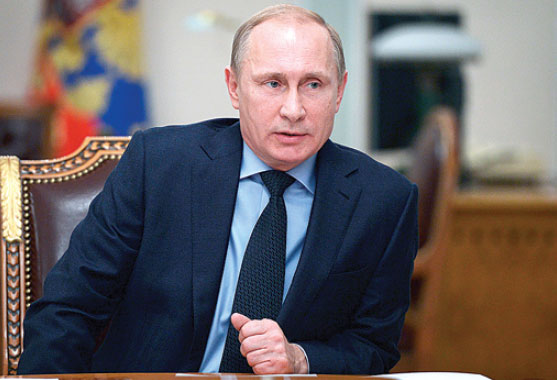Russian stocks drop on S&P junk rating
Updated: 2015-01-28 07:36
By Bloomberg(China Daily USA)
|
||||||||
Russian stocks tumbled the most in six weeks in US trading, led by OAO Sberbank, after Standard & Poor's lowered the country's credit rating to junk.
The Bloomberg Russia-US Equity Index fell 5.5 percent on Monday, the most since Dec 16. Sberbank's American depositary receipts retreated 13 percent on volumes 1.7 times the average of the past three months. Rouble forwards declined 2.4 percent as of 12:14 pm in Hong Kong.
Stocks sank and the rouble closed at a record low on Monday after S&P cut Russia one step to BB+ with a negative outlook. The ratings company said in a statement that the cut reflects its view that the country's "monetary policy flexibility has become more limited and its economic growth prospects have weakened". Gross domestic product is projected to shrink this year as declining oil prices exacerbate the impact of sanctions linked to the conflict in Ukraine.
|
Russian President Vladimir Putin speaks during a Cabinet meeting on the government's anti-crisis plan at the Novo-Ogaryovo residence outside Moscow, Russia, on Monday. Standard& Poor's lowered the country's credit rating to junk on Monday. AP |
"The economy is already weak and it's going to suffer even more now as credit becomes a luxury," Rudolph-Riad Younes, co-founder and portfolio manager at R Squared Capital Management LP in New York, said.
"The private sector is getting paralyzed as banks can't lend, money is leaving the country and more people are getting killed in Ukraine as the crisis escalates and oil remains below $50 per barrel. All that looks like a catastrophic scenario."
Sanctions decision
European Union nations will decide whether to tighten sanctions against Russia after a rocket attack killed dozens in the port city of Mariupol on Saturday and fighting between separatists and Kiev government troops intensified in eastern Ukraine. The United States has also warned Russia that it risks further economic pressure if the situation doesn't improve.
"The falling oil prices are a problem for Russia, but it is the sanctions, we believe, that are causing all of the turmoil in the equity, credit and currency markets. The downgrade is the right thing to do at this stage," said David Riedel, president of Riedel Equity Research in New York.
The central bank in December increased its key interest rate 7.5 percentage points over five days to 17 percent to try to stem the rouble's decline. S&P said it expects that "credit to the economy will be curtailed, which will likely further undermine growth". Russian corporate borrowers have been locked out of international debt markets under the sanctions.
Russia's $2 trillion economy will expand at an average 0.5 percent a year in 2015 through 2018, compared with an average annual growth rate of 2.4 percent in the previous four years, S&P said. GDP is poised to shrink 3.5 percent in 2015, according to the median estimate of 29 analysts surveyed by Bloomberg. It would be the first recession since 2009, when the economy contracted 7.8 percent.
"Russia is already non-investable because of the geopolitical crisis and sanctions that followed, as well as the deteriorating economy and lack of clarity on how the government will tackle the crisis," said Elena Loven, senior manager of more than 1 billion euros ($1.1 billion) in Russian stocks at Swedbank Robur in Stockholm. "Russian equities have been trading at valuations that price in the risk of non-investment credit rating grade for quite some time. I wouldn't expect any major sell-off."
(China Daily USA 01/28/2015 page16)
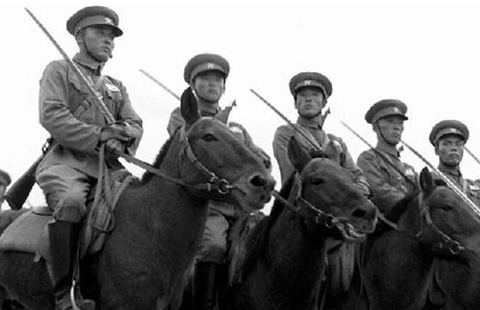
 Old photos of China's military parade
Old photos of China's military parade
 US, China expected to lead on climate talks
US, China expected to lead on climate talks
 Chinese high-court member discusses legal reform
Chinese high-court member discusses legal reform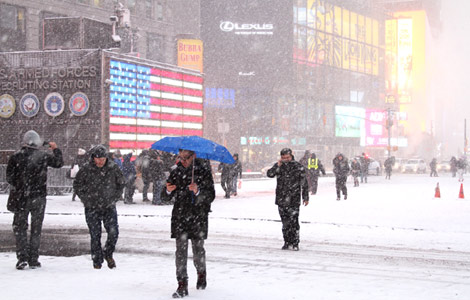
 Northeastern US braces for 'crippling' blizzard
Northeastern US braces for 'crippling' blizzard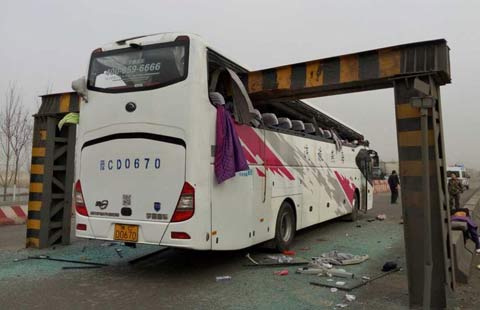
 At least 2 dead, dozens hurt after bus hits road barrier
At least 2 dead, dozens hurt after bus hits road barrier
 Red carpet of 21st annual SAG Awards in Los Angeles
Red carpet of 21st annual SAG Awards in Los Angeles
 New Year celebrated with dance mix
New Year celebrated with dance mix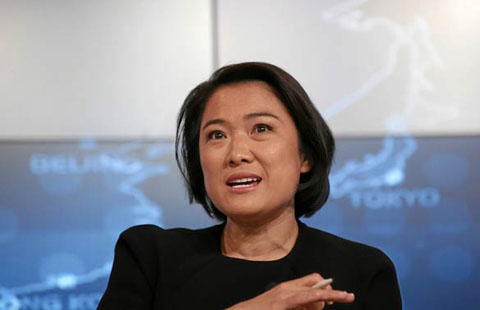
 Businesswomen shine at the World Economic Forum
Businesswomen shine at the World Economic Forum
Most Viewed
Editor's Picks

|

|

|

|

|

|
Today's Top News
Parade will commemorate victory over Fascism
Expatriates to be lured for startups
Yahoo to spin off Alibaba shares
China opens its market to all US apples
Beijing gears up for Super Bowl
Rock-Paper-Scissors: Paper wins
10 million new jobs on way in China, Li vows
Obama's trip to India spurs triangle chatter
US Weekly

|

|
